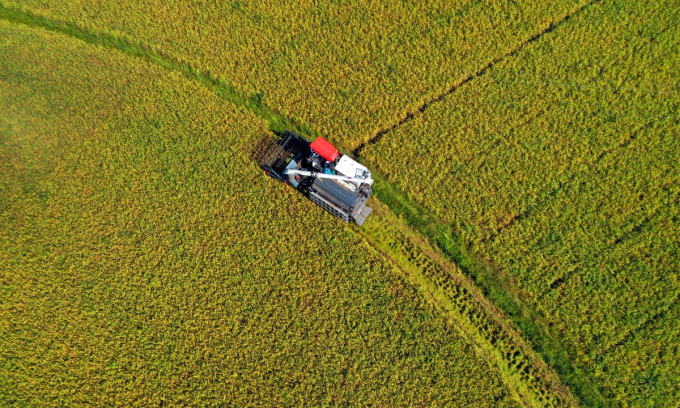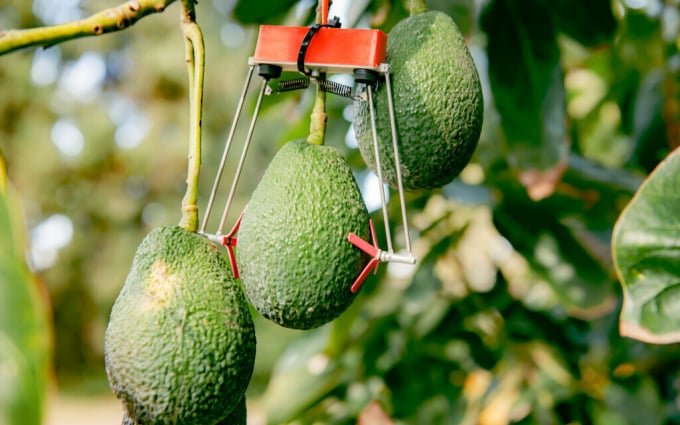May 25, 2025 | 18:43 GMT +7
May 25, 2025 | 18:43 GMT +7
Hotline: 0913.378.918
May 25, 2025 | 18:43 GMT +7
Hotline: 0913.378.918

Drip-irrigated rice crops in Turkey. Photo: Netafim
As the battle to increase crop output faces off with ever-worsening extreme weather, Israeli agtech (agricultural tech) innovators are finding fresh ways to update and re-invent farming. Tech in agriculture is not novel but the agricultural field is taking its creativity up a notch as it adopts and devises new methods to change how farming functions.
“Climate [change] is becoming more unpredictable,” Matan Rahav, director of business development at Israeli agriculture analytics company CropX, told The Times of Israel in a videoconference call this month. “At the end of the day, farmers have to produce more food with fewer resources and less water and at the same time, we expect farmers to become more environmentally sustainable. So, the only way to overcome this is by harnessing and utilizing data and innovative technologies.”
A recently published NASA-led study showing how climate change could impact the production of crops as early as within the next 10 years has ensured the farming sector stays in the spotlight of environmental discourse. The research results reverberated around the globe as the study forecasted that maize yields could drop by 24 percent in some parts of the world “due to rising temperatures, changing growing seasons, increasing atmospheric carbon dioxide levels, and more erratic rainfall.”
The main takeaway from the study, published in the journal Nature Food, was that advanced climate models combined with crop projection models indicated that crops worldwide would be affected by climate impacts much earlier than had been previously thought.
“We did not expect to see such a fundamental shift, as compared to crop yield projections from the previous generation of climate and crop models conducted in 2014,” lead author Jonas Jägermeyr, a crop modeler and climate scientist at NASA’s Goddard Institute for Space Studies (GISS) and The Earth Institute at Columbia University in New York City, told NASA’s Earth Science News Team. “A 20% decrease from current [maize] production levels could have severe implications worldwide.”
Local entrepreneurs and scientists in the agtech sector were not surprised by the findings.
“We know that global agriculture is already disrupted by climate change. The report focused on two small things, yield of corn and wheat,” said Rahav, who pointed out that in addition to crop yields, floods, droughts, new weeds and pathogens, and water resources are all in flux due to ever-changing environments.
“The report doesn’t scare me because we have the ability to mitigate some of these effects,” Dr. Calanit Bar Am, chief strategy officer at AI-powered food system intelligence platform Trellis, said in an interview with The Times of Israel. “We have the ability to adapt… actually, [this report] could be an opportunity. So, we have to be a little bit more creative.”
Moreover, she expressed confidence that technology will lead to “new opportunities” in farming.
“Science, data, and technology will play a major role in adapting to climate change effects on crop yield and quality of maize and wheat and will introduce new opportunities to the entire food value chain,” Bar Am said.
A little more creative

SupPlant says its sensors upload data from the plant, the soil, and the weather so farmers can make better decisions. Photo: SupPlant
Israeli companies have developed solutions for the agriculture value chain’s multiple stakeholders, from crop growers to food companies to retailers. After all, this country has long been acknowledged for its groundbreaking technologies and startups in the food and agricultural tech sector.
Local companies, some of which have become market leaders, offer promising and innovative solutions in precision irrigation, crop monitoring, insect-pollinated and wind-pollinated plants, aquaculture waste treatment, post-harvest treatment, wheat enhancement, and crop pollination. Companies pioneering new tech include Kaiima, a castor genetics and breeding company that improves plant productivity for large scale agricultural systems; Phytech, an IoT startup that provides farmers with decision-support services to better their yield; Tevel Aerobotics Technologies, a robotics platform for orchard harvest and management; and, of course, Netafim, the global leader of sustainable precision irrigation.
“There are many amazing agtech companies offering incredible solutions for different aspects of the farm,” said Rahav. CropX was named earlier this year as one of the World Economic Forum’s “Technology Pioneers” for its farm management platform that creates self-installable soil sensors that store and analyze real-time soil data.
Meanwhile, Trellis uses an AI-powered system to reduce agricultural waste and improve food production efficiencies by helping farmers better harvest the correct amount of a crop and better use limited resources.
“On the farm level, growers will need to adopt new heat-resistant breeds and change their growing practices. Food waste currently estimated at 40% can no longer be afforded by our society and should be cut to zero. Food companies already understand that better sourcing, production and inventory optimization will give them a competitive edge and allow them a continuous supply of high-quality products,” Bar Am explained. “Data, artificial intelligence (AI) and machine learning (ML) tools are key to capitalize on these opportunities.”
“There are many unknowns; every year is different; agriculture is never on time,” said Ilay Englard, CEO and co-founder of Trellis. “It’s very hard to learn from the historical signals or what happened in the past. Agriculture is a biological system… and it is chaotic. It’s really about integrating hundreds of data layers together, understanding exactly how to quantify them, and then make sure it’s actionable for the grower or the buyer, or the seller, or the inventory manager.”
Ori Ben Ner, CEO of precision agriculture company SupPlant, reiterates the need for innovative technologies in the face of changing weather patterns.
“We need to think of sensors because of climate change,” Ben Ner told The Times of Israel. “Most irrigation models were developed in the 1980s-1990s and are no longer relevant to the weather patterns we have today. The seasons have changed; it no longer rains when it used to; there are worldwide droughts.”
SupPlant is harnessing data from its sensors to improve farming. Its sensors are placed on five locations on the plant — deep soil, shallow soil, stem, leaf, and fruit. The data culled from the sensors “is uploaded to the cloud every 10 minutes and combined with climatic forecasts in order to give the farmer unique and precise irrigation recommendations and insights,” Ben Ner told The Times of Israel.
“This is very helpful in day-to-day farming, but especially crucial before an outstanding weather event is expected, while granting the farmer specific irrigation recommendations to ‘weather the storm’ and not over-, or under-, irrigate.”
SupPlant’s technology was recently named one of TIME magazine’s 100 Best Inventions for 2021 (alongside three other Israeli inventions.)
At the UN’s COP26 climate conference earlier this month, countries and organizations committed to increased “investment in agricultural research and innovation to create more climate-resilient, low-emission technologies and practices.”
(Times of Israel)

(VAN) Alt Carbon has raised $12 million in a seed round as it plans to scale its carbon dioxide removal work in the South Asian nation.

(VAN) Attempts to bring down the price of the Japanese staple have had little effect amid a cost-of-living crisis.

(VAN) Fourth most important food crop in peril as Latin America and Caribbean suffer from slow-onset climate disaster.

(VAN) Shifting market dynamics and the noise around new legislation has propelled Trouw Nutrition’s research around early life nutrition in poultry. Today, it continues to be a key area of research.

(VAN) India is concerned about its food security and the livelihoods of its farmers if more US food imports are allowed.

(VAN) FAO's Director-General emphasises the need to work together to transform agrifood systems.

(VAN) Europe is facing its worst outbreak of foot-and-mouth since the start of the century.